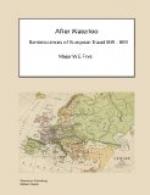and firmness of the inhabitants of the Canton de Vaud
and of its Government in particular. The central
Government of the Union was at that time held at Bern
and it was agreed upon in the Diet that Switzerland
should remain perfectly neutral during the approaching
conflict; an army of observation of 80,000 men was
voted and levied to enforce this neutrality, but the
command of it was given to De Watteville, who had
been a colonel in the English service, and was a determined
enemy of the French Revolution and of everything connected
with or arising out of it. On the approach of
the Austrian army, De Watteville, instead of defending
the frontier and repelling the invasion, disbanded
his army and allowed the Austrians to enter. No
doubt he was encouraged, if not positively ordered
to do this, by the Government of Bern, many members
of which are supposed to have received bribes from
the British Government to render the decreed neutrality
null and void. At the same moment that this army
was disbanded, the directoral Canton (Bern) caused
to be intimated to the Canton de Valid that it was
the wish and intention of the High Allies to replace
Switzerland in the exact state it was in, previous
to the French Revolution; and that, in consequence,
two Commissioners would be sent from Bern to Lausanne,
to take charge of the Bureaux, Archives and insignia
of Government, etc., and to act as a provisional
Government under the direction of Bern. The Landamman
and the grand and petty council at Lausanne, on learning
this intelligence, immediately saw thro’ the
scheme that was planned to deprive them of their independence;
they, therefore, passed a decree, threatening to arrest
and punish as conspirators the Commissioners, should
they dare to set their foot in the Canton, and declaring
such of their countrymen who should aid or abet this
scheme, or deliver up a single document to the Commissioners,
traitors and rebels; they likewise called on the whole
Canton to arm in defence of its independence and proclaimed
at the same time that should this plan be attempted
to be carried into execution, they would join their
forces to those of Napoleon and thus endanger the position
of the Allies. They took their measures accordingly;
the whole Canton Sew to arms; the Bernois and the
Allies were alarmed and consultations held; the Count
de Bubna, the Austrian General, being consulted, thought
the attempt so hazardous and so pregnant with mischief
that he had the good sense to recommend to the Allied
Powers and to the Canton of Bern to desist from their
project and not to make or propose any alteration in
the Helvetic Constitution, as guaranteed in 1814.
His advice was of great weight and was adopted, and
thus the Vaudois by their firmness preserved their
independence. They met with great support likewise
on this trying occasion from General La Harpe, preceptor
to the Emperor of Russia, and a relation to the gentleman
of the same name who was so instrumental in the emancipation
of Vaud. La Harpe, who enjoyed the confidence
of his pupil, exerted himself greatly in procuring
his good offices in favour of the Vaudois his countrymen,
and this was no small weight in the scale.




